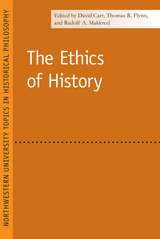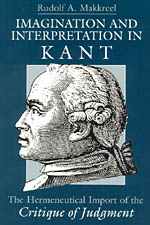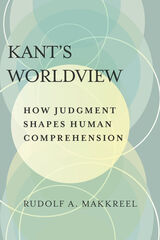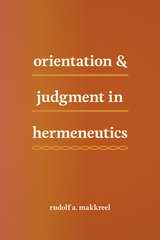4 books about Makkreel, Rudolf A.

The Ethics of History
John McCumber
Northwestern University Press, 2004
What is implied by "ethics of history"? The authors of this volume, internationally renowned philosophers and intellectual historians, address this question in all its novelty and ambiguity and develop varied perspectives on the place and nature of ethics in the philosophy, enterprise, and practice of history.
Is the whole historical process--largely consisting of the actions and sufferings of persons and groups--subject to ethical constraint? And what of the ways in which historians present their subject matter; are these methods subject to moral scrutiny? Although they approach these issues from different directions, the contributors agree in their critique of the correspondence theory of history, tin their acceptance of an unbridgeable gap between the past and the historian's present account, and in their call for a revision of the popular appeal to historical objectivity.
[more]

Imagination and Interpretation in Kant
The Hermeneutical Import of the Critique of Judgment
Rudolf A. Makkreel
University of Chicago Press, 1990
In this illuminating study of Kant's theory of imagination and its role in interpretation, Rudolf A. Makkreel argues against the commonly held notion that Kant's transcendental philosophy is incompatible with hermeneutics. The charge that Kant's foundational philosophy is inadequate to the task of interpretation can be rebutted, explains Makkreel, if we fully understand the role of imagination in his work. In identifying this role, Makkreel also reevaluates the relationship among Kant's discussions of the feeling of life, common sense, and the purposiveness of history.
[more]

Kant's Worldview
How Judgment Shapes Human Comprehension
Rudolf A. Makkreel
Northwestern University Press, 2022
In Kant’s Worldview: How Judgment Shapes Human Comprehension, Rudolf A. Makkreel offers a new interpretation of Immanuel Kant’s theory of judgment that clarifies Kant’s well-known suggestion that a genuine philosophy is guided by a world‑concept (Weltbegriff). Makkreel shows that Kant increasingly expands the role of judgment from its logical and epistemic tasks to its reflective capacity to evaluate objects and contextualize them in worldly terms. And Makkreel shows that this final orientational power of judgment supplements the cognition of the understanding with the comprehension originally assigned to reason.
To comprehend, according to Kant, is to possess sufficient insight into situations so as to also achieve some purpose. This requires that reason be applied with the discernment that reflective judgment makes possible. Comprehension, practical as well as theoretical, can fill in Kant’s world concept and his sublime evocation of a Weltanschauung with a more down-to-earth worldview.
Scholars have recently stressed Kant’s impure ethics, his nonideal politics, and his pragmatism. Makkreel complements these efforts by using Kant’s ethical, sociopolitical, religious, and anthropological writings to provide a more encompassing account of the role of human beings in the world. The result is a major contribution to our understanding of Kant and the history of European philosophy.
To comprehend, according to Kant, is to possess sufficient insight into situations so as to also achieve some purpose. This requires that reason be applied with the discernment that reflective judgment makes possible. Comprehension, practical as well as theoretical, can fill in Kant’s world concept and his sublime evocation of a Weltanschauung with a more down-to-earth worldview.
Scholars have recently stressed Kant’s impure ethics, his nonideal politics, and his pragmatism. Makkreel complements these efforts by using Kant’s ethical, sociopolitical, religious, and anthropological writings to provide a more encompassing account of the role of human beings in the world. The result is a major contribution to our understanding of Kant and the history of European philosophy.
[more]

Orientation and Judgment in Hermeneutics
Rudolf A. Makkreel
University of Chicago Press, 2015
This book provides an innovative approach to meeting the challenges faced by philosophical hermeneutics in interpreting an ever-changing and multicultural world. Rudolf A. Makkreel proposes an orientational and reflective conception of interpretation in which judgment plays a central role. Moving beyond the dialogical approaches found in much of contemporary hermeneutics, he focuses instead on the diagnostic use of reflective judgment, not only to discern the differentiating features of the phenomena to be understood, but also to orient us to the various meaning contexts that can frame their interpretation.
Makkreel develops overlooked resources of Kant’s transcendental thought in order to reconceive hermeneutics as a critical inquiry into the appropriate contextual conditions of understanding and interpretation. He shows that a crucial task of hermeneutical critique is to establish priorities among the contexts that may be brought to bear on the interpretation of history and culture. The final chapter turns to the contemporary art scene and explores how orientational contexts can be reconfigured to respond to the ways in which media of communication are being transformed by digital technology. Altogether, Makkreel offers a promising way of thinking about the shifting contexts that we bring to bear on interpretations of all kinds, whether of texts, art works, or the world.
Makkreel develops overlooked resources of Kant’s transcendental thought in order to reconceive hermeneutics as a critical inquiry into the appropriate contextual conditions of understanding and interpretation. He shows that a crucial task of hermeneutical critique is to establish priorities among the contexts that may be brought to bear on the interpretation of history and culture. The final chapter turns to the contemporary art scene and explores how orientational contexts can be reconfigured to respond to the ways in which media of communication are being transformed by digital technology. Altogether, Makkreel offers a promising way of thinking about the shifting contexts that we bring to bear on interpretations of all kinds, whether of texts, art works, or the world.
[more]
READERS
Browse our collection.
PUBLISHERS
See BiblioVault's publisher services.
STUDENT SERVICES
Files for college accessibility offices.
UChicago Accessibility Resources
home | accessibility | search | about | contact us
BiblioVault ® 2001 - 2024
The University of Chicago Press









